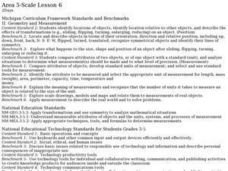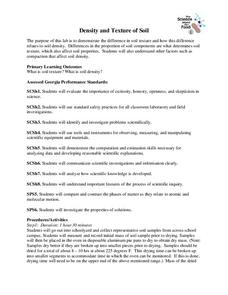Curated OER
Surveying Our Media
Learners participate in a lesson that is concerned with the concept of examining the use of media in society. They create surveys to measure the presence of the media in everyday life. The results are collected and represented in the...
Curated OER
An "Eggs"traordinary Sculpture
Eighth graders identify and categorize different types of animals which lay eggs, use a five step method for viewing and interpreting a piece of artwork, and use an indirect method to find the mass of a large object.
Curated OER
Matter, Matter, Everywhere!
Eighth graders make inquiry about the existence of matter. A definition of the word is needed before students can engage in various activities. The application of knowing about matter is done in the working of experiments.
Curated OER
It's About Time!
Students examine concept of time, and explore difference between analog and digital clocks; students make art project to represent time and create a time-story problem and solution.
Alabama Learning Exchange
Inner and Outer Planets
Students explore the solar system. In this planets lesson, students learn about the other planets in the solar system. They watch a video clip from National Geographic on the solar system, compare and contrast the planets and create a...
Curated OER
Scaled Rubber Band Drawings
Students demonstrate the process of creating a scaled rubber band enlargement of a simple drawing. They observe and discuss a teacher-led demonstration, and create a scaled rubber band enlargement of simple drawings and their invention...
Curated OER
Miras, Mirrors, and Kaleidoscopes!
High schoolers use hands-on activities to explore transformations. They view a video segment that demonstrate how M. C. Escher employed geometry and transformations to create so many of his famous drawings.
Centers for Ocean Sciences
Ocean and Great Lakes Literacy: Principle 1
Is your current lesson plan for salt and freshwater literacy leaving you high and dry? If so, dive into part one of a seven-part series that explores the physical features of Earth's salt and freshwater sources. Junior hydrologists...
University of Georgia
Energy Content of Foods
Why do athletes load up on carbohydrates the evening before a competition? The lesson helps answer this question as it relates the type of food to the amount of energy it contains. After a discussion, scholars perform an experiment...
Curated OER
The Scientific Search for the Loch Ness Monster
Students gain an understanding of the real world applications of the scientific method. They design their own experiments to prove or disprove the existence of other modern legends, and they design and carry out an experiment to test a...
University of Georgia
Density and Texture of Soil
All soil is not created equal! A lab activity asks learners to collect and analyze soil. Specific calculations determine the amount of sand, silt, and clay in a sample and allow individuals to identify the soil texture.
Pennsylvania Department of Education
Build What I've Created
n this geometric instructional activity, students define and identify two dimensional shapes based on their attributes. They complete worksheets based on the geometric concepts.
Virginia Department of Education
Weather Patterns and Seasonal Changes
Get your class outside to observe their surroundings with a lesson highlighting weather patterns and seasonal changes. First, learners take a weather walk to survey how the weather affects animals, people, plants, and trees during...
Purdue University
Design of an Earthen Dam for a Lafayette Neighborhood
How do dams support bodies of water? Scholars engage in a hands-on STEM activity where they design, build, and test dams to learn about bodies of water and how humans use natural resources. They learn how criteria and constraints affect...
Curated OER
Too Many Tamales
Pupils investigate Mexican holiday celebrations and compare them to American Christmas holidays. They conduct a Mexican Christmas Scavenger Hunt. The activity uses a streaming video in order to engage students in the main objectives.
Curated OER
Hold on Tight!
Students explore the relationship between plant roots and the soil in which they grow. They examine photos of uprooted trees and desert areas and
conduct experiments designed to highlight this mutual relationship between roots and soil....
Curated OER
Tick Around the Clock
Students examine and discuss the differences between clocks they are shown. Using the internet, they research how people used to tell time before clocks. They review what the long and short hand on the clock represent and practice...
Shodor Education Foundation
Volume of Prisms
Explore the concept of volume of prisms using an applet to perform the calculations. The link to the interactive applet is embedded into the lesson plan as well as a link to associated data sheets. Get your math class to the computer lab...
Curated OER
Volume of Rectangular Prisms
Introduce the procedure needed to find the volume of a rectangular prism. Learners rank various prisms such as cereal boxes and tissue boxes from smallest to largest volume. They use an applet to find the volume and surface area of each...
Curated OER
Maps and Modes, Finding a Mean Home on the Range
Fifth graders investigate data from maps to solve problems. In this data lesson, 5th graders study maps and collect data from each map. Students present their data in a variety of ways and calculate the mode, mean, median, and range.
Curated OER
Move it! With Simple Machines
Students know the six simple machines and explain what they do and how they have changed the lives of humans.
Curated OER
Antacid Tablet Race
Young scholars complete experiments to determine how rocket fuel is affected by surface area and temperature. They compare the reaction rates of antacid tablets. They discuss their results to complete the lesson.
Curated OER
Newtonian Mechanics
Students familiarize themselves, through teacher demonstration, with Gavendish's apparatus first used for experimentally determining the value of the Universal Gravitational Constant G, and calculate theoretical value of Earth's...
Curated OER
Exploring Area and Perimeter
Two students are blindfolded and each receives a cardboard square, one with pompoms glued around the edge and one with pompoms glued all over the surface. They identify what they feel. The class discusses perimeter and area of polygons....























